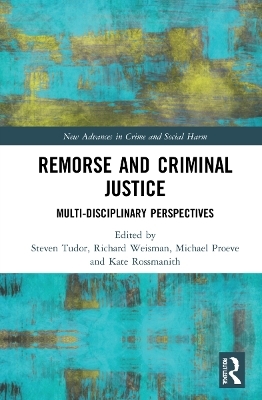
Remorse and Criminal Justice
Routledge (Verlag)
978-1-032-10476-8 (ISBN)
This multi-disciplinary collection brings together original contributions to present the best of current thinking about the nature and place of remorse in the context of criminal justice. Despite the widespread and long-standing nature of interest in offender remorse, the topic has until recently been peripheral in academic studies.
The authors are scholars from North America, the United Kingdom, Europe, South Africa and Australia, from diverse academic disciplines. They reflect on the role of remorse in law, for better or for worse; on how expressions of remorse are affected by the legal contexts in which they arise; and on the impact of these expressions on the individual, the court and the community. The work is divided into four parts – Part I Judging Remorse addresses issues concerning the task of assessing remorse in the courtroom, usually prior to determining sentence. Part II Remorse Beyond the Courtroom explores the place and significance of remorse in various post-court settings. Part III Remorse, War and Social Trauma addresses remorse in the context of political violence and social trauma in the former Yugoslavia and South Africa. Finally, Part IV Reflections seeks to underscore the multi-disciplinary and inter-disciplinary nature of the collection as a whole, through personal and disciplinary reflections on remorse.
The work provides a showcase for how diverse academic disciplines can be brought together through a focus on a common topic. As such, the collection will become a standard reference work for further research across a range of disciplines and promote inter-disciplinary dialogue.
Steven Tudor is a Senior Lecturer in the Law School at La Trobe University, Australia. He has also worked as a lawyer and as a public servant for the Victorian state government, specialising criminal law policy and reform issues. His PhD was in philosophy and his research interests mostly concern the philosophical aspects of criminal law, especially issues relating to emotions and conscience. Richard Weisman is Professor Emeritus, Law and Society Program, Department of Social Science, York University, Toronto, Canada. For the past two decades, his research has centered on exploring the interpenetration of law and moral regulation as well as the interrelationship between legal discourse and popular discourse. Michael Proeve is a Senior Lecturer in the School of Psychology at the University of Adelaide, and a forensic and clinical psychologist. He has also worked as a practising psychologist for the Victorian and South Australian governments and in private practice and as a manager of treatment services in several correctional settings. His PhD concerned remorse as an internal and interpersonal emotion, and his published works concern remorse, shame, risk assessment, and mindfulness. Kate Rossmanith is an author, essayist and academic. Her background is in anthropology, performance studies and creative writing, and she researches the role of emotion, enactment and narrative in legal contexts. She is an Associate Professor of Media and Cultural Studies at Macquarie University, Sydney.
Introduction
Part I: Judging Remorse
Chapter 1: Remorse and Judging
Chapter 2: Remorse and Sentencing in a World of Plea Bargaining
Chapter 3: Temporary Irresponsibility, Foolish Mistakes, and Outright Villains: Narratives of Remorse in Sexual Assault Trials
Chapter 4: Reflections on the Grey Zone: ‘Sort of Remorseful’ Offenders
Chapter 5: Cranking the Sausage Machine: A Magistrate’s Perspective on Remorse Assessment
Part II: Remorse Beyond the Courtroom
Chapter 6: Remorse, Probation and the State
Chapter 7: Long Haul Remorse: The Continuous Performance of Repentance Throughout Prison Sentences
Chapter 8: Perceptions of Remorse in Forensic Patients
Chapter 9: Remorse on Death Row
Part III: Remorse, War and Social Trauma
Chapter 10: Remorse in International Criminal Justice: Sentencing, Offender Rehabilitation and Reintegration: A Case Study of the International Tribunal for the Former Yugoslavia
Chapter 11: Remorse as Ethical Encounter and the Impossibility of Repair
Part IV: Reflections
Chapter 12: Reflections on Researching Remorse: Unearthing an Epistemological Unconscious
| Erscheinungsdatum | 04.11.2021 |
|---|---|
| Reihe/Serie | New Advances in Crime and Social Harm |
| Zusatzinfo | 1 Line drawings, black and white; 1 Illustrations, black and white |
| Verlagsort | London |
| Sprache | englisch |
| Maße | 156 x 234 mm |
| Gewicht | 480 g |
| Themenwelt | Geisteswissenschaften ► Philosophie ► Ethik |
| Geisteswissenschaften ► Psychologie ► Allgemeine Psychologie | |
| Recht / Steuern ► EU / Internationales Recht | |
| Recht / Steuern ► Strafrecht ► Strafverfahrensrecht | |
| Sozialwissenschaften ► Soziologie | |
| ISBN-10 | 1-032-10476-7 / 1032104767 |
| ISBN-13 | 978-1-032-10476-8 / 9781032104768 |
| Zustand | Neuware |
| Informationen gemäß Produktsicherheitsverordnung (GPSR) | |
| Haben Sie eine Frage zum Produkt? |
aus dem Bereich


